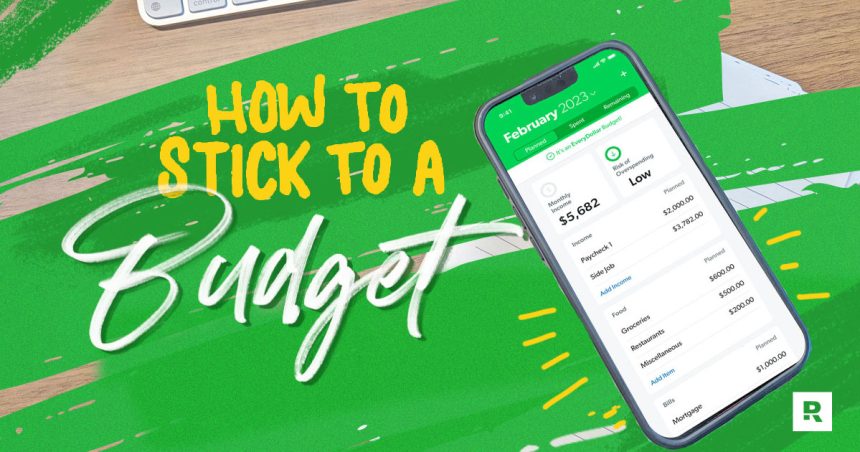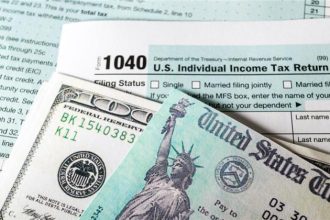Let’s be real: Setting up a budget isn’t the hard part. Sticking to it? That’s where most people struggle.
Budgeting isn’t a set-it-and-forget-it deal. You can’t just plug in numbers and hope for the best. You’ve got to check in, adjust and stay intentional.
If you’re tired of your budget falling apart by week two, these tips will help you stick with it and make progress every month.
How to Stick to a Budget: 11 Tips to Help You Stay on Track
1. Use the zero-based budgeting method.
You need to create a budget you can actually stick to. And the best way to do that is with a zero-based budget—where your income minus your expenses equals zero.
Now, that doesn’t mean you spend all your money—it means you plan where every dollar goes, from bills and groceries to giving and savings. When every dollar has a job, it’s way easier to stay in control and on track.
2. Keep it real.
Ever set a goal that was doomed from the start? Like reading 10 books a month when you barely have time to finish one, or running 10 miles a day when you’ve never run at all?
Big goals are great, but they’ve got to be realistic. Same goes for your budget. Don’t plan to spend $0 on clothes if it’s back-to-school season. But do challenge yourself where you can—like skipping restaurants for a month and putting that money toward your goal. When you keep it real, you set yourself up for success instead of failure.
3. Check your calendar.
Your BFF’s birthday? That book club you’re hosting next month? Yep, it’s on the calendar. A lot of “surprise” expenses aren’t surprises—they’re just ones you didn’t plan for. So, check your social calendar before you make your budget for the month.
Be sure to budget for the real stuff coming up, not just the basics. And good news: If you budget with EveryDollar, you don’t have to build your budget from scratch every month—just copy last month’s and tweak the parts that need it. A little planning goes a long way.
4. Set up autodraft.
Budgeting is how you take control of your money. But automation can help make sure things go according to plan. Set up automatic transfers for bills, savings and sinking funds so the money moves as soon as your paycheck hits.
You’re still the one calling the shots—this just keeps things on track. It keeps you from forgetting the essentials and removes the temptation to spend what you set aside for your goals.
5. Meal plan.
Want to beat the drive-thru temptation and stay on budget? Plan your meals—breakfast, lunch, dinner and snacks. Then make a grocery list and stick to it.
Meal planning helps you spend with intention at the store and keeps your restaurant budget from going up in flames midweek. When you plan ahead, you save money and stress (and waste less food).
6. Track every expense.
If you don’t track your spending throughout the month, your budget’s just a wish. Every swipe, tap or Venmo transfer counts—so track it all. Use your budgeting app (hey, EveryDollar!) or pencil and paper, if that’s your style.
Tracking your spending gives you clarity and control. It helps you stick to your budget today and plan smarter for tomorrow.
7. Think weekly, not just monthly.
A monthly budget shows you the big picture—but thinking weekly helps you follow the plan. Try breaking big budget lines into weekly amounts. For example, $300 of personal spending is $75 a week. A $967 grocery budget? About $242 a week. Thinking in bite-sized chunks helps you pace yourself, avoid overspending, and stay steady all month long.
8. Ditch the credit card.
You don’t need a credit card to get by—and you definitely don’t need one to get ahead. In fact, credit cards keep you paying for the past. They make it easy to overspend with a deal-with-it-later mindset. But “later” comes with interest, fees and stress.
If you want to stick to your budget, ditch the credit game. Budgeting with the money you actually have keeps you in control and out of debt.
9. Learn to say no (or not yet).
Your budget doesn’t always say “no way.” But it often says “not this month.” And that’s okay. Instead of giving in to impulse buys, practice saving up, paying in cash, and staying focused on your goals. Sometimes, you do have to say no—and that’s not a failure, it’s a flex. Saying no to spending now means saying yes to bigger wins later.
10. Find accountability.
Want to win with money faster? Don’t go it alone. Get an accountability partner—someone who’ll cheer you on and call you out when needed. If you’re married, you’ve got a built-in teammate. If not, ask a friend or family member who’ll keep it real with you.
Check in every month to review your budget and set goals. A good budget meeting keeps you focused, honest and encouraged. There’s no weakness in asking for help—and honestly, you’ll go farther with someone in your corner.
11. Celebrate the wins.
Sticking to your budget isn’t always easy. So, when you do it, celebrate it! Paid off a credit card? Stayed under your grocery budget? Skipped takeout for a whole month? That’s a win! Give yourself a high five, tell your accountability partner, and do a happy dance.
Celebrating progress keeps you motivated and reminds you why this whole budgeting thing is so worth it.
Create a Budget You Can Actually Stick To
Sticking to a budget takes more than just good intentions. It takes real habits—like planning ahead, tracking your spending, meal planning, saying “not yet,” and celebrating the wins. When you build those habits, your budget stops feeling like a chore and becomes part of your everyday routine. And that’s where EveryDollar comes in!
The EveryDollar app is designed to help you make budgeting a habit. You can easily create your zero-based budget, adjust it for what’s coming up, and track your spending as you go.
Create your free EveryDollar budget today—it’s quick, easy and built to help you not just make a plan, but also stick to it.
Read the full article here
















